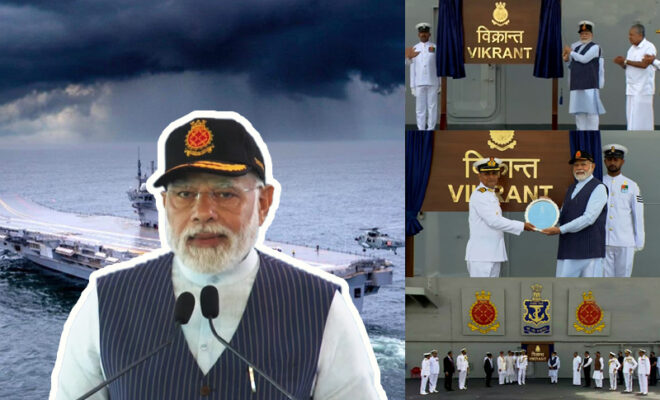INS Vikrant: PM Modi To Commission First Indigenous Aircraft Carrier

India is becoming self-reliant rapidly. Today the country will get the first Indigenous Aircraft Carrier ‘INS Vikrant’ today. PM Modi is going to unveil it shortly.
The first indigenous aircraft carrier, INS Vikrant, the largest ship ever built in Indian maritime history and equipped with cutting-edge automation technologies, will be commissioned by Prime Minister Narendra Modi today at Cochin Shipyard Limited.
The new Naval Ensign (Nishaan), which sheds the colonial past and honors the rich Indian maritime tradition, will also be unveiled at the occasion by the Prime Minister.
According to a defense spokesman, the activation of Vikrant will be a key step toward India becoming self-sufficient in the defense industry.
Also Read: India Get Its First Indigenously-Built Aircraft Carrier ‘INS Vikrant’
It is an example of Atma Nirbharta (Self-reliant) in the defense sector, the PM tweeted.
INS Vikrant is an example of Government’s thrust to making India’s defence sector self-reliant. https://t.co/97GkAzZ3sk
— Narendra Modi (@narendramodi) September 2, 2022
With the launching of “Vikrant,” India will join a small group of countries with the specialized expertise to design and construct an aircraft carrier domestically. This will serve as a true testament to the government of India’s Make in India initiative.
The warship was constructed using technology and gear that was indigenous to India that was provided by more than 100 MSMEs.
There are several pieces of indigenous machinery and equipment, produced by big industrial companies nationwide as well as more than 100 MSMEs.
Indian maritime security will be improved by the commissioning of Vikrant, which will provide the country two operational aircraft carriers.
The indigenous aircraft carrier is named after her illustrious predecessor, India’s first aircraft carrier, which was instrumental in the war of 1971 and was designed by the Warship Design Bureau (WDB), the Indian Navy’s internal organization, and constructed by Cochin Shipyard Limited which is a Public Sector Shipyard under Ministry of Ports, Shipping & Waterways.
The framework for IAC was set in April 2005 during a formal Steel Cutting ceremony, which means Vikrant, which means valiant and victorious.
Steel Authority of India Limited (SAIL) worked with the Defense Research & Development Laboratory (DRDL) and the Indian Navy to effectively indigenize the warship grade steel needed for the building of the IAC in order to further the indigenization process.
Following that, the hull’s construction advanced, and the ship’s foundation was placed in February 2009.
The successful initiative of the ship in August 2013 marked the end of the very first phase of ship construction.
Also Read: India Prides In Its Homegrown Aircraft Carrier To Be Commissioned In 2022
The 262 m long and 62 m broad Vikrant has an endurance of 7500 NM and a maximum planned speed of 28 knots. When fully laden, it can carry about 43000 T.
The ship contains over 2,200 compartments, including specialized quarters for female officers and sailors, and it is built for a crew of about 1,600 people.
The carrier is outfitted with the newest cutting-edge technology and equipment, and it was constructed with a very high level of automation for ship navigation, machinery operations, and survivability.
The ship is equipped with a full-fledged, cutting-edge medical complex, complete with the newest medical equipment facilities, major modular OT, emergency modular OT, physiotherapy clinic, ICU, laboratories, CT scanner, X-Ray machines, dental complex, isolation ward, and telemedicine facilities, among other things.
The ship would be able to fly an air wing of 30 aircraft, including MiG-29K fighter jets, Kamov-31 multi-role helicopters, MH-60R multi-role helicopters, as well as Light Combat Aircraft (LCA) and Advanced Light Helicopters (ALH) made domestically (Navy).
The IAC is outfitted with a ski-jump for launching aircraft and a set of three “arrestor wires” for their recovery onboard.
This new aircraft operation mode is termed as Short Take Off But Arrested Recovery (STOBAR).
The commissioning of “Vikrant” would be a proud and historic moment for the country, showcasing our “Atma Nirbhar” credentials during “Azadi Ka Amrit Mahotsav,” a true memorial to the country’s zeal and fervor in pursuing capability build up towards enhanced maritime security in the Indian Ocean Region and shall demonstrate Indian Navy’s unwavering commitment to contribute to peace and stability in the region, according to the Defense statement.
Thus, the induction and rebirth of “Vikrant” is not only a step toward improving our defense readiness, but it is also our modest way of paying tribute to the courageous warriors who fought for the country’s independence in 1971 as well as our freedom fighters.



